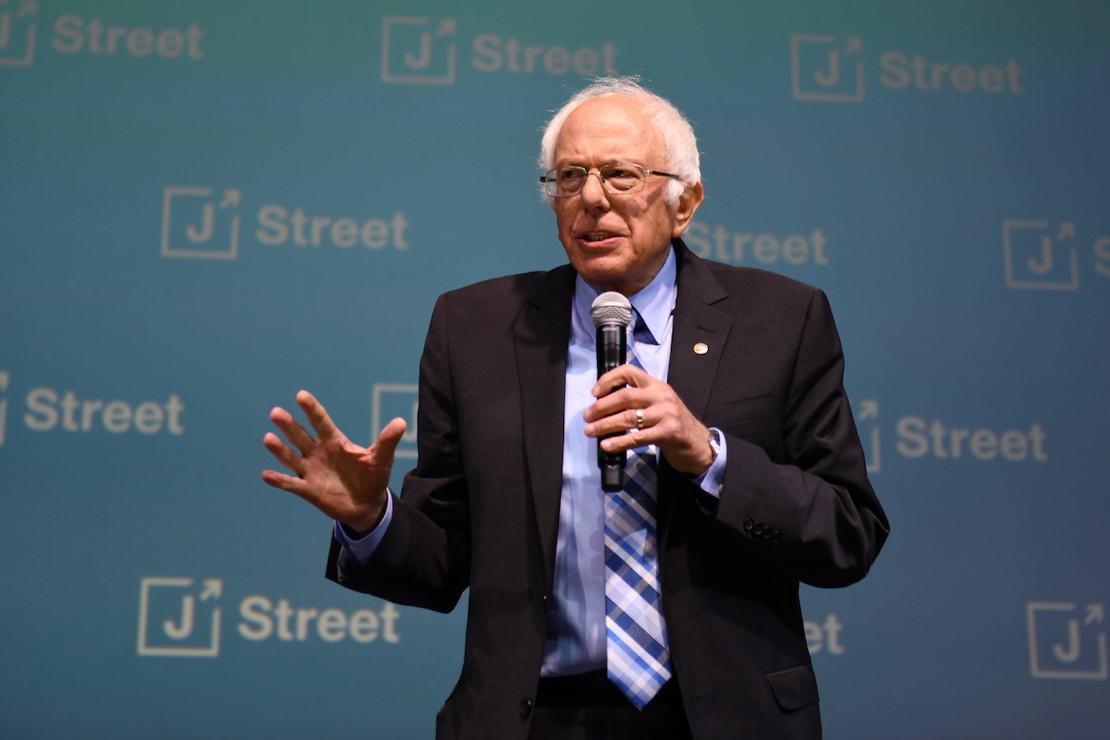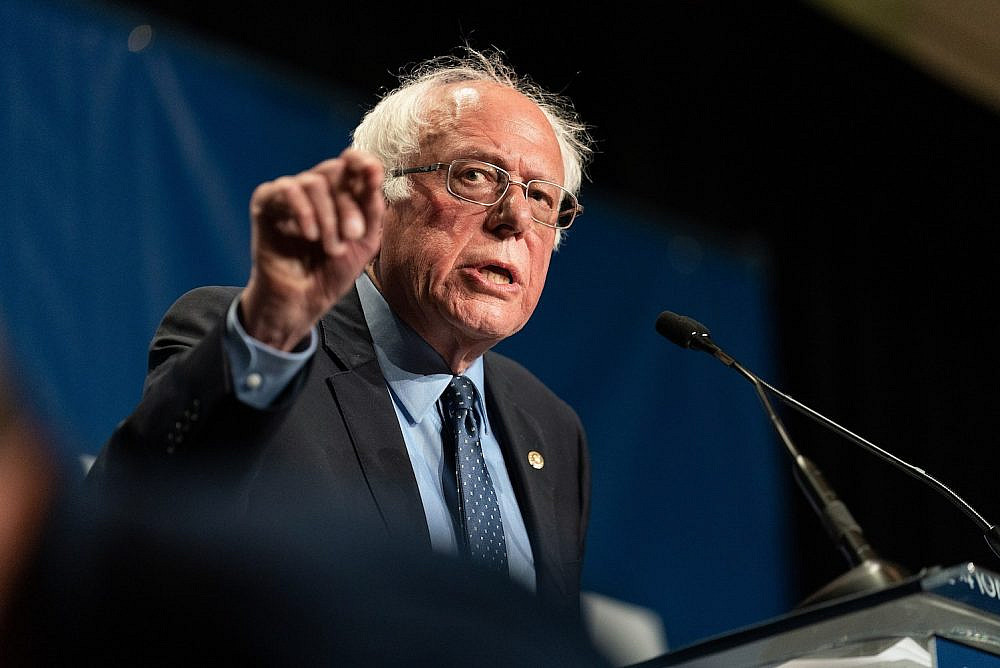Bernie Sanders is now the front-runner in the Democratic presidential primary. He won the popular vote in the Iowa Caucus less than two weeks ago and the New Hampshire primary earlier this past week. He is leading the polls nationally and is the favorite in a number of important, upcoming states.
Even if he does not win the nomination — not to say anything of the presidency, though he beats Donald Trump nationally in some polls, too — he will end his campaign as the most successful Jewish politician in modern U.S. history. And yet, the American Jewish establishment is not supporting Sanders’ historic campaign. On the contrary: they’re actively working to stop it.
In an article published on Friday by The Intercept, journalists Ryan Grim and Akela Lacy reported that the American Israel Public Affairs Committee (AIPAC), the powerful pro-Israel lobby, is helping to fund the Democratic Majority for Israel (DMFI) to run attack ads on TV against Sanders in Nevada, which will hold its presidential caucuses next Saturday. DMFI is led by Mark Mellman, a veteran AIPAC strategist who has also worked for Yesh Atid and Blue and White in the previous rounds of Israeli elections.
Although DMFI claims to be independent, 11 of its 14 board members have direct ties to AIPAC — either as volunteers, donors, or speakers, as Alex Kane reported in The Nation. Furthermore, AIPAC is reportedly allowing contributions to DMFI to count as donations to AIPAC. Prior to its Nevada ad push, DMFI spent $800,000 on TV ads attacking Sanders ahead of the Iowa caucuses.
Alongside the paid advertising campaigns, the American Jewish press has, since Sanders’ first presidential campaign in 2016, run relentlessly negative coverage of the leading candidate. He has been accused of not really being a Jew, of being the wrong kind of Jew, of being ashamed to be Jewish, and even of being an anti-Semite. In an article for Tablet Magazine, James Kirchick accused Sanders of downplaying his Jewishness as “a source of awkward embarrassment,” and argued that Sanders was only using his Jewish background as a way to denounce Israel and other Jews.

An article published in the right-wing site Algemeiner accused Sanders of being “a Jew of shame” for his willingness to criticize Israeli policy. In an article for Commentary, Seth Mandel charged that Sanders showed “discomfort with his own Jewish roots,” which could only be explained by his socialist politics and “ideological distaste for the Jewish state.” In an op-ed for the Times of Israel, writer Yossi Klein Halevi wrote: “Bernie Sanders is not an enemy of the Jewish people. He simply doesn’t care enough about Jewish concerns to be considered a friend.” These are only a few of the numerous articles put out by Jewish publications attacking Sanders and his Jewishness.
And yet there is nothing radical about Sanders’ views on Israel. To the contrary, Sanders — whose father’s family was wiped out during the Holocaust in Poland — describes himself as “100-percent-pro-Israel” and as “proudly Jewish.” He is more or less a conventional liberal Zionist: strongly critical of Benjamin Netanyahu, whose government he has called “racist”; opposed to the occupation; still committed to a two-state solution; and willing to use U.S. government pressure to hold Israel accountable for its actions. He even spent time living and working on Kibbutz Sha’ar Ha’amkim in the 1960s. Most American Jews hold views similar to Sanders: the majority feel positively connected to Israel, disagree with its right-wing government’s policies, and believe the U.S. should exert pressure on Israel.
What makes Sanders different from other American politicians when it comes to Israel-Palestine — and one of the reasons he has come under such ferocious attack from the organized Jewish community — is that he openly supports “Palestinian freedom and independence,” as he wrote earlier this year in Jewish Currents. And unlike most other self-described two-state proponents, Sanders has actually called for measures that would put pressure on Israel to stop settlement construction and its human rights abuses in Gaza. Speaking at J Street’s 2019 conference, Sanders said: “$3.8 billion is a lot of money. We cannot give it carte blanche to the Israeli government… We have the right to demand respect for human rights and democracy.”
But more than Sanders’ own views, it is the views of some of Sanders’ prominent supporters that have drawn the ire of the American Jewish establishment. Sanders has been accused of tolerating — or worse, encouraging — anti-Semitism by accepting the endorsements of Palestinian Congresswoman Rashida Tlaib and Rep. Ilhan Omar, as well as progressive Palestinian-American community organizer Linda Sarsour.

All three young Muslim women face enormous amounts of criticism and online abuse (in December, the Guardian reported that Tlaib and Omar were the targets of an international, Islamophobic fake-news operation based in Israel). All three are outspoken supporters of boycott, divestment and sanctions (BDS) and strong opponents of the occupation (Tlaib and Omar were denied entry to Israel last August for this reason). Last March, Omar was accused of making anti-Semitic comments and forced to apologize after she implied that AIPAC uses its significant financial resources to shutdown criticism of Israeli policies. The irony, of course, is that AIPAC’s funding of attacks against Bernie Sanders proves what nearly everyone knew but did not want to admit: that she was right.
The American Jewish establishment, with the help of Israel’s Strategic Affairs Ministry, has invested significant money and energy in fighting the BDS movement — from pushing laws in state legislatures that make it illegal to boycott Israel, to an executive order that codifies anti-Zionism as a form of anti-Semitism and designates certain criticisms of Israel as potential violations of Jewish students’ civil rights. Although there is a long history of anti-Zionism in Jewish communities around the world, for groups like the Anti-Defamation League (ADL), there is no difference between it and actual forms of Jew hatred. ADL CEO Jonathan Greenblatt has even claimed that those “who deny that anti-Zionism is anti-Semitism are contributing to the problem” of anti-Semitic violence.
In this warped and backwards reasoning, Sanders is, absurdly, guilty of fomenting anti-Semitism because he has supporters who believe that all people living between the Jordan River and the Mediterranean Sea should have equal rights.
All this is a sign of just how far to the right the American Jewish establishment has lurched during the Netanyahu era. Had he remained in Israel on the kibbutz, Sanders would likely be just another septuagenarian supporter of the left-wing Zionist Meretz party. But in many Jewish communities in the United States, even views like those of Meretz have long been considered beyond the pale.
This article was first published in Hebrew on Local Call. Read it here.


